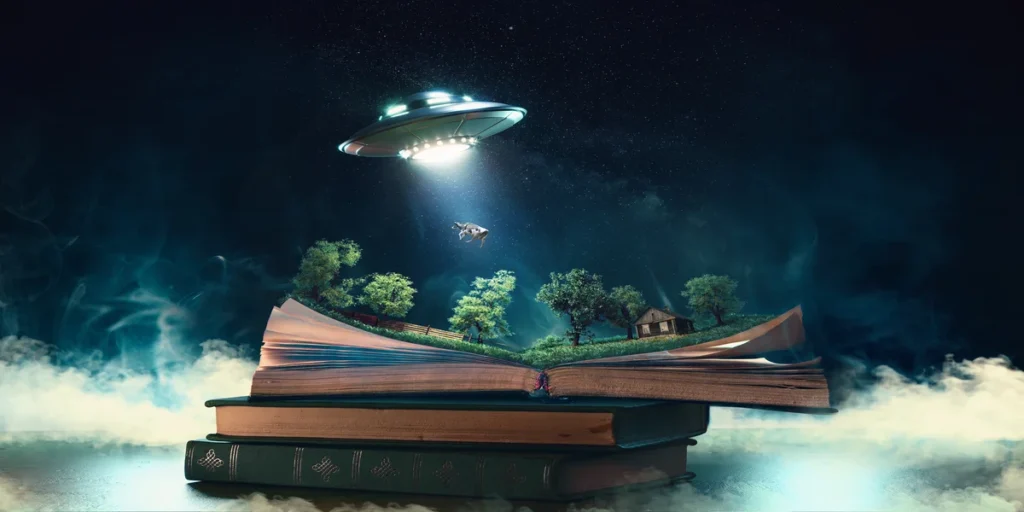
Science fiction books transport readers to charming realms of imagination, combining scientific principles, speculative ideas, and fantastical factors to create narratives that discover the probabilities of the future, alternate realities, and the nature of humanity itself. These books regularly delve into the intersection of science, technology, and society, posing thought-provoking questions and envisioning worlds that venture our perceptions and push the boundaries of what is recognised and possible.
Science fiction books frequently function awesome encounters with alien civilizations, introducing readers to numerous and resourceful extraterrestrial lifestyles forms, These encounters shed mild on our very own humanity, cultural differences, and the vastness of the universe.

| Name | Dune |
| Author | Frank Herbert |
| Category | Science Fiction |
| Published | 1965 |
Dune by Frank Herbert is a landmark in science fiction literature, first published in 1965. Set in a distant future amidst a sprawling feudal interstellar empire, the novel centers on the desert planet Arrakis. Arrakis is the sole source of “spice,” a highly valuable substance that grants prolonged life, heightened awareness, and the ability to navigate space. The story follows Paul Atreides, a young nobleman whose family inherits control of Arrakis. As Paul navigates the political intrigue and environmental challenges of the planet, he begins to realize his destiny as a prophesied leader who will bring great change to the universe.
Herbert’s Dune is acclaimed for its complex characters, intricate plot, and richly detailed world-building. It delves into themes of power, religion, and ecology, exploring the interplay between humanity and its environment. The novel’s depiction of a harsh desert world and the indigenous Fremen people, who have adapted to its brutal conditions, serves as a profound commentary on resource exploitation and survival. Dune has inspired numerous adaptations and sequels, cementing its status as a seminal work that continues to resonate with readers and influence the science fiction genre.
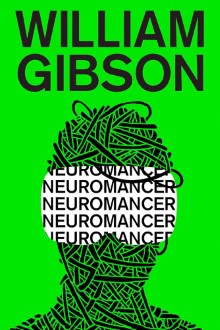
| Name | Neuromancer |
| Author | William Gibson |
| Category | Science Fiction |
| Published | 1984 |
Neuromancer by William Gibson, published in 1984, is a seminal work in the cyberpunk genre, introducing readers to a gritty, high-tech future. The novel follows Case, a washed-up computer hacker who is hired by a mysterious employer named Armitage to pull off the ultimate hack. Damaged by a previous employer who crippled his nervous system, Case is desperate to regain his ability to jack into cyberspace. With the help of Molly, a street samurai with cybernetic enhancements, and other eclectic allies, Case navigates a world of artificial intelligences, corporate espionage, and virtual reality to complete his mission.
Gibson’s Neuromancer is celebrated for its visionary depiction of cyberspace and its influence on the development of the internet and virtual reality concepts. The book’s dark, dystopian atmosphere and its blend of high-tech and low-life elements have defined the cyberpunk aesthetic. Themes of identity, consciousness, and the fusion of human and machine are explored in depth, reflecting concerns about technology’s impact on society. Neuromancer not only won prestigious awards like the Hugo, Nebula, and Philip K. Dick Awards but also left an indelible mark on science fiction and popular culture, inspiring countless works across various media.

| Name | Foundation |
| Author | Isaac Asimov |
| Category | Science Fiction |
| Published | 1951 |
Foundation by Isaac Asimov, first published in 1951, is a cornerstone of science fiction literature, renowned for its epic scope and profound ideas. The novel introduces Hari Seldon, a brilliant mathematician who develops psychohistory—a theoretical science combining history, sociology, and statistical mathematics to predict the future of large populations. Foreseeing the imminent fall of the Galactic Empire and a subsequent dark age lasting 30,000 years, Seldon establishes the Foundation, a group of scientists and engineers tasked with preserving knowledge and reducing the dark age to just a millennium. The story chronicles the struggles and triumphs of the Foundation as it navigates political, economic, and military challenges over centuries.
Asimov’s Foundation is praised for its intellectual depth and ambitious storytelling, presenting a future where human behavior can be predicted and influenced on a grand scale. The novel explores themes of determinism, the rise and fall of civilizations, and the power of knowledge. Its non-linear narrative, spanning vast periods of time, allows readers to witness the evolution of the Foundation’s society and its impact on the galaxy. “Foundation” has had a lasting influence on science fiction, inspiring numerous authors and adaptations, and remains a testament to Asimov’s visionary imagination and his ability to weave complex, thought-provoking tales.

| Name | 1984 |
| Author | George Orwell |
| Category | Science Fiction |
| Published | 1949 |
1984 by George Orwell, published in 1949, is a powerful dystopian novel that explores the dangers of totalitarianism. Set in a grim future where the world is divided into three superstates perpetually at war, the story centers on Winston Smith, a low-ranking member of the ruling Party in Oceania. The Party, led by the enigmatic Big Brother, exercises absolute control over every aspect of life. Through constant surveillance, propaganda, and the manipulation of truth, the Party suppresses individual thought and maintains its grip on power. Winston, disillusioned and yearning for freedom, begins a covert rebellion against the oppressive regime, which leads him on a harrowing journey of resistance and self-discovery.
Orwell’s 1984 is lauded for its chilling depiction of a society where individuality is crushed, and dissent is eradicated. The novel delves into themes of surveillance, censorship, and the malleability of truth, warning of the perils of unchecked governmental power and the loss of personal freedoms. Orwell’s vivid portrayal of a world where language is distorted through “Newspeak” and reality is constantly rewritten by the Party has left a lasting impact on readers and popular culture. 1984 serves as a cautionary tale about the fragility of democracy and the importance of vigilance in safeguarding human rights and liberties, cementing its status as one of the most influential works of the 20th century.
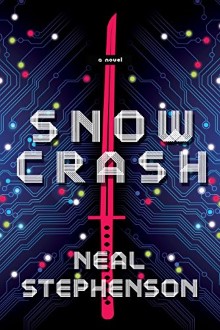
| Name | Snow Crash |
| Author | Neal Stephenson |
| Category | Science Fiction |
| Published | 1992 |
Snow Crash by Neal Stephenson, published in 1992, is a groundbreaking work of cyberpunk fiction that combines high-tech futurism with ancient mythology. The novel is set in a hyper-commercialized future America, where the government has largely disbanded, and corporate-controlled city-states dominate. The protagonist, Hiro Protagonist, is a skilled hacker and sword-wielding pizza delivery driver. He becomes embroiled in a complex plot involving a new virtual reality drug called Snow Crash, which is not only lethal in the digital realm but also affects users in the real world. With the help of Y.T., a daring skateboard courier, Hiro races to uncover the origins of Snow Crash and prevent it from wreaking havoc on society.
Stephenson’s Snow Crash is acclaimed for its fast-paced narrative, witty dialogue, and inventive world-building. The novel explores themes of information control, the convergence of human and digital consciousness, and the power of ancient knowledge in a digital age. Stephenson’s vivid depiction of the Metaverse—a virtual reality universe—has been particularly influential, foreshadowing the development of modern virtual worlds and online communities. By blending elements of science fiction, satire, and cyberpunk, Snow Crash offers a thought-provoking commentary on the interconnectedness of technology, culture, and identity, making it a seminal work that continues to resonate with readers and shape the genre.
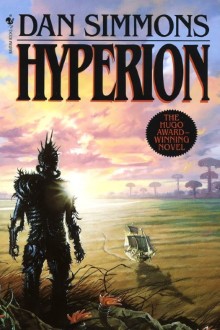
| Name | Hyperion |
| Author | Dan Simmons |
| Category | Science Fiction |
| Published | 1989 |
Hyperion by Dan Simmons, published in 1989, is a seminal work of science fiction that intertwines rich storytelling with profound philosophical questions. Set in the distant future, the novel is part of the Hyperion Cantos series and follows seven pilgrims on a voyage to the distant world of Hyperion. Each pilgrim has been chosen to make this journey due to their unique connection to the planet and its mysterious entity known as the Shrike, a creature of immense power that resides in the Time Tombs—structures that move backward through time. As they travel, each pilgrim recounts their personal story, revealing a tapestry of interconnected lives and destinies shaped by love, loss, faith, and vengeance.
Simmons’ Hyperion is lauded for its intricate narrative structure, which echoes Geoffrey Chaucer’s “The Canterbury Tales,” and its deep exploration of complex themes such as time, religion, and the nature of humanity. The novel’s richly developed characters and diverse perspectives create a multifaceted world that is both immersive and intellectually stimulating. By blending elements of epic poetry, literary homage, and speculative fiction, Hyperion challenges readers to contemplate the mysteries of existence and the human condition. It stands as a towering achievement in science fiction literature, influencing subsequent works and captivating audiences with its imaginative scope and emotional depth.
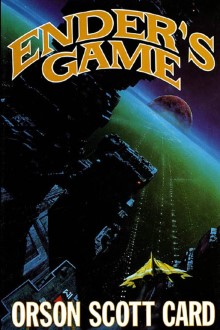
| Name | Ender’s Game |
| Author | Orson Scott Card |
| Category | Science Fiction |
| Published | 1985 |
Ender’s Game by Orson Scott Card, published in 1985, is a landmark in science fiction literature, celebrated for its gripping narrative and complex moral questions. The story is set in a future where humanity faces annihilation from an insectoid alien race known as the Formics. To prepare for the impending threat, the government recruits gifted children and subjects them to rigorous training at Battle School, a space station dedicated to developing military leaders. The protagonist, Andrew “Ender” Wiggin, is a prodigious child chosen for his exceptional intelligence and tactical prowess. Throughout his training, Ender excels in simulated war games, demonstrating extraordinary leadership and strategic skills, but also grappling with intense isolation and the burden of responsibility.
Card’s Ender’s Game delves into themes of war, ethics, and the psychological impact of training young children for combat. The novel explores the fine line between reality and simulation, and the moral implications of using advanced technology for warfare. Ender’s journey raises questions about the cost of survival, the nature of humanity, and the ethics of manipulating individuals for the greater good. The book’s compelling characters and thought-provoking scenarios have resonated with readers for decades, earning it numerous awards and a lasting influence on both science fiction and broader discussions about ethics in warfare and leadership.
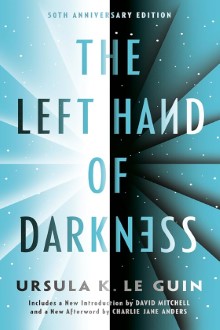
| Name | The Left Hand of Darkness |
| Author | Ursula K. Le Guin |
| Category | Science Fiction |
| Published | 1969 |
The Left Hand of Darkness by Ursula K. Le Guin is a groundbreaking science fiction novel set on the planet Gethen, where the inhabitants are ambisexual humans. The story follows Genly Ai, an envoy from the Ekumen, a coalition of humanoid worlds, who is sent to Gethen to persuade its leaders to join the coalition. Through his interactions with the Gethenians, particularly Estravan, a disgraced politician, Ai learns about the complexities of Gethenian society and the fluid nature of gender and sexuality. The novel delves deep into themes of duality, identity, and the intricate tapestry of human relationships, challenging readers to rethink their preconceived notions about sex and gender.
Le Guin’s masterful world-building and her exploration of profound philosophical questions make “The Left Hand of Darkness” a seminal work in science fiction literature. The harsh, icy landscape of Gethen serves as a backdrop for a rich narrative that examines the interplay between politics, culture, and personal connections. Le Guin’s nuanced portrayal of the characters’ inner lives and her insightful commentary on societal norms offer a thought-provoking and immersive reading experience. The Left Hand of Darkness is not only a tale of adventure and discovery but also a powerful meditation on the nature of humanity.
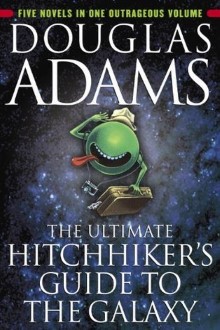
| Name | The Hitchhiker’s Guide to the Galaxy |
| Author | Douglas Adams |
| Category | Science Fiction |
| Published | 1996 |
The Hitchhiker’s Guide to the Galaxy by Douglas Adams is a comedic science fiction novel that follows the misadventures of Arthur Dent, an ordinary human who is whisked away from Earth just before its destruction. Arthur is rescued by Ford Prefect, an alien researcher for the titular guidebook, and together they embark on a journey through space. They encounter a host of quirky characters, including Zaphod Beeblebrox, the two-headed, eccentric president of the galaxy; Trillian, the only other human survivor of Earth’s destruction; and Marvin, a depressed robot. The novel is renowned for its witty humor, satirical take on bureaucracy and technology, and its absurd yet insightful commentary on life and the universe.
Adams’ novel is a rich tapestry of clever wordplay, surreal scenarios, and philosophical musings, all wrapped up in a delightfully unpredictable plot. The Hitchhiker’s Guide itself, an electronic book providing quirky and often hilariously inadequate advice, serves as a central narrative device, offering both practical tips and existential reflections. Through its blend of humor and speculative fiction, The Hitchhiker’s Guide to the Galaxy explores themes of absurdity, the randomness of existence, and the search for meaning in a chaotic universe. The book’s enduring popularity and influence can be attributed to Adams’ unique voice and his ability to infuse profound ideas with a light-hearted, comedic touch.
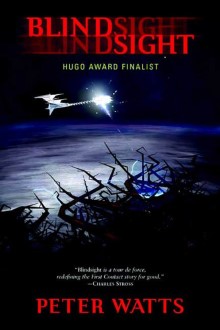
| Name | Blindsight |
| Author | Peter Watts |
| Category | Science Fiction |
| Published | 2006 |
Blindsight by Peter Watts is a hard science fiction novel that delves into the nature of consciousness and human identity through a gripping, speculative narrative. Set in the late 21st century, the story follows a crew of highly specialized individuals sent to investigate a mysterious alien signal from the edge of the solar system. The protagonist, Siri Keeton, is a “synthesist” who has lost half his brain to epilepsy surgery and serves as a human interface for the mission. Alongside him are a linguist with multiple personalities, a biologist turned into a vampire, and other uniquely modified humans. As they encounter an enigmatic alien entity called the “Rorschach” the crew faces profound existential threats and questions about the very essence of human consciousness.
Watts’ novel is a dense, intellectually challenging work that combines elements of psychology, neuroscience, and evolutionary biology to explore the limits of perception and self-awareness. Blindsight critically examines whether consciousness is truly necessary for intelligence and survival, positing that our sense of self might be a mere evolutionary byproduct. The novel’s chilling atmosphere, rigorous scientific grounding, and philosophical depth create a thought-provoking narrative that pushes the boundaries of traditional science fiction. Through its exploration of alien intelligence and the dark corners of the human mind, Blindsight offers a profound commentary on what it means to be truly aware and the possible future of human evolution.


